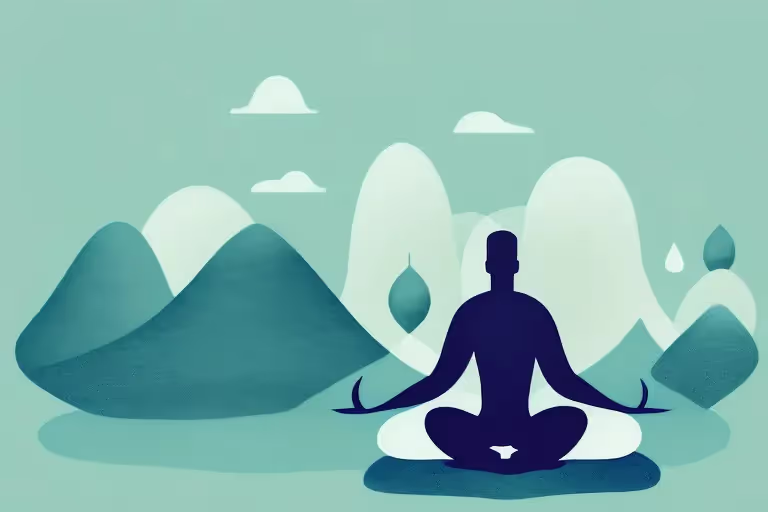Many people believe that meditation can only be done while sitting in the lotus position, with a straight back and crossed legs. However, there are alternative ways to meditate, including lying down. In this article, we will explore the effectiveness of meditating while lying down, comparing it to the traditional sitting posture. So, let's delve into the fascinating world of meditation and discover if lying down meditation is truly effective.
Understanding the Basics of Meditation
Defining Meditation and Its Goals
Meditation is a practice that dates back thousands of years and is rooted in various religious and spiritual traditions. It involves training the mind to focus and redirect thoughts, ultimately leading to a state of deep relaxation and increased awareness.
The goals of meditation are numerous. For some, it is a pathway to self-discovery, while others seek stress reduction, mental clarity, or spiritual growth. Regardless of the reasons why individuals practice meditation, the ultimate aim is to achieve a sense of inner peace and well-being.
When practicing meditation, individuals often find themselves in a quiet and peaceful environment, free from distractions. This allows them to fully immerse themselves in the present moment and cultivate a sense of mindfulness. By focusing their attention on the breath or a specific object, meditators learn to observe their thoughts and emotions without judgment, creating a space for self-reflection and personal growth.
Moreover, meditation is not limited to a specific time or place. It can be incorporated into daily life, whether it's a few minutes of mindful breathing during a busy workday or a longer session in a dedicated meditation space. The flexibility of meditation makes it accessible to people of all ages and backgrounds, offering a wide range of benefits.
Different Postures in Meditation
Traditionally, meditation is performed in a seated position. Several postures, such as the lotus pose or the half-lotus pose, are commonly associated with meditation. These postures are believed to promote stability and an upright spine, allowing for better energy flow during the practice.
However, there are also alternative postures, such as kneeling, walking, or lying down. Each posture offers its own unique benefits and challenges. Today, we will focus on the lying down meditation posture and explore its origins, philosophy, and how it works.
The lying down meditation posture, also known as the supine position, is a comfortable and relaxing way to practice meditation. It involves lying flat on your back with your arms by your sides and your legs extended. This posture is particularly beneficial for individuals who may have difficulty sitting for long periods or those who experience back pain or discomfort.
When practicing meditation in the lying down posture, it is important to find a quiet and peaceful space where you can fully relax. You may choose to use a yoga mat or a comfortable surface such as a bed or a carpeted floor. It is essential to ensure that your body is properly supported and that you are warm and comfortable.
Once you are in the lying down posture, close your eyes and begin to focus on your breath. Feel the gentle rise and fall of your abdomen as you inhale and exhale. Allow your body to sink into the surface beneath you, releasing any tension or tightness. As thoughts arise, simply acknowledge them and let them go, returning your attention to the breath.
The lying down meditation posture offers a unique opportunity to explore the connection between body and mind. As you relax your physical body, you may find that your mind becomes more receptive to the present moment. This posture can be particularly helpful for individuals who struggle with anxiety or insomnia, as it promotes deep relaxation and a sense of calm.
It is worth noting that the lying down posture can also be used for guided meditation practices. By listening to a guided meditation recording or following along with a meditation app, you can enhance your experience and deepen your relaxation. Guided meditations often provide instructions and visualizations that can help you cultivate specific qualities, such as compassion, gratitude, or self-acceptance.
Overall, the lying down meditation posture offers a gentle and nurturing approach to meditation. It allows you to surrender to the present moment, letting go of any expectations or judgments. Whether you choose to practice meditation in a seated position or explore the lying down posture, the key is to find a practice that resonates with you and supports your overall well-being.
The Concept of Lying Down Meditation
Origins and Philosophy
Lying down meditation, also known as supine meditation, has its origins in ancient yoga practices. It is said to have been developed as a way to rejuvenate the body and mind, promoting deep relaxation and healing.
The philosophy behind lying down meditation is centered around surrendering to gravity and allowing the body to fully rest and release tension. By lying down, practitioners aim to create a sense of deep trust and surrender, promoting a state of profound relaxation and openness.
How Lying Down Meditation Works
When meditating in a lying down position, it is crucial to find a comfortable surface, such as a mat or a supportive mattress. The body should be relaxed, with the arms resting by the sides and the legs slightly apart.
During lying down meditation, the focus is primarily on the breath and body sensations. Practitioners aim to cultivate mindfulness and awareness while remaining in a state of deep relaxation.
By lying down, the body is in a natural position of rest, allowing for relaxation of the muscles and a reduction in physical tension. This can create an environment conducive to entering a state of deep meditation.
Comparing Sitting and Lying Down Meditation
Physical Differences and Impacts
On the surface, lying down meditation may seem more desirable than the more physically demanding sitting posture. After all, who wouldn't want to relax and meditate at the same time?
However, there are physical differences and impacts to consider. When lying down, there is an increased risk of falling asleep, especially for those who struggle with fatigue or sleep deprivation. This can hinder the ability to reach a deep meditative state.
On the other hand, sitting upright in a traditional meditation posture requires more effort and engagement from the body. This can help maintain alertness and focus, preventing drowsiness and enhancing the meditation experience.
Mental and Emotional Effects
Mentally and emotionally, lying down meditation can create a sense of ease and relaxation. It may be particularly beneficial for individuals experiencing physical pain or discomfort.
Nevertheless, sitting meditation often emphasizes stability and groundedness, allowing practitioners to develop a strong foundation for their mindfulness practice. It encourages a sense of wakefulness and mental clarity, which can enhance the overall meditative experience.
Benefits of Meditating While Lying Down
Physical Health Benefits
Lying down meditation can bring various physical health benefits. It can help relieve tension in the body, promote better sleep, and alleviate body pain or discomfort.
Research indicates that lying down meditation may also have positive effects on blood pressure, heart rate, and overall cardiovascular health. The relaxation response induced by this posture can contribute to a healthier body and a calmer mind.
Mental Health Benefits
Mental health can greatly benefit from lying down meditation as well. It can help reduce stress, anxiety, and depression. By inducing a state of relaxation, lying down meditation allows individuals to release mental and emotional tension, promoting a sense of well-being and tranquility.
Moreover, lying down meditation can provide a safe space for self-reflection and introspection. It allows individuals to connect with their inner selves and explore their emotions and thoughts in a deeper and more profound way.
Potential Drawbacks of Lying Down Meditation
Risk of Falling Asleep
One of the main potential drawbacks of lying down meditation is the increased risk of falling asleep. When the body is in a horizontal position and relaxation is induced, it can be challenging to maintain alertness and focus.
For individuals who struggle with fatigue or have a tendency to fall asleep easily, lying down meditation may not be the most effective option. It is important to find the right balance between relaxation and maintaining an active and awake state of mind during the practice.
Possible Physical Discomfort
Another drawback of lying down meditation is the risk of experiencing physical discomfort during the practice. If the body is not fully supported or if the chosen surface is too firm or too soft, it can lead to discomfort in the back, neck, or other bodily regions.
To alleviate this issue, it is crucial to find a comfortable and supportive surface and experiment with different positions and props to find what works best for each individual.
In conclusion, while meditating while lying down can offer relaxation and various health benefits, it is essential to consider personal preferences, physical limitations, and desired outcomes when choosing a meditation posture. Each individual may find that a certain posture suits their needs better than others.
At Aura Health App, we understand that meditation is a deeply personal practice. Our app provides a variety of guided meditations, allowing users to customize their meditation experience and explore different postures, including lying down meditation. Discover the power of meditation with Aura Health App today.
Aura is Your All In One App for Meditation, Mindfulness Wellbeing
Find peace every day with one app for your whole well-being. There is no one-size-fits-all solution to mental well-being. Aura is the first all-in-one wellness app that learns how to best help you. Discover an endless library of expert-created tracks for your well-being, all taught by the world’s best coaches, therapists, and storytellers. With Aura's personalized recommendations, you can find peace every morning, day and night.



.webp)






.avif)

%20(1).avif)


.avif)
.avif)
.webp)


.avif)


















































































































.avif)

















.svg)









